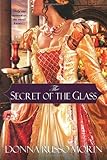Historical Fiction
 In 17th century Venice, the Murano glassmakers are celebrated but also on a tight rope. If any glassmaker tries to leave the city, they are killed because Venice lawmakers don't want the secret of the glass to go beyond the city. The Fiolario's own a glass shop where father Zino guides the workers. His eldest daughter Sophia also knows the secret of the glass, but she's a female and her working in the shop is forbidden. When Galileo enters the shop to inquire about making lenses for his new invention of the telescope, Sophia dangerously takes this on herself.
In 17th century Venice, the Murano glassmakers are celebrated but also on a tight rope. If any glassmaker tries to leave the city, they are killed because Venice lawmakers don't want the secret of the glass to go beyond the city. The Fiolario's own a glass shop where father Zino guides the workers. His eldest daughter Sophia also knows the secret of the glass, but she's a female and her working in the shop is forbidden. When Galileo enters the shop to inquire about making lenses for his new invention of the telescope, Sophia dangerously takes this on herself.
Sophia is soon betrothed to a man she has no feelings for and learns that he plans to take her family's money, send her up north away from her mother, and send her sisters to the convent. She doesn't know what she can do about it though, as women didn't have much power in these times. As her fiance parades her in front of the community of noblemen and women, she makes friends with Teodoro, a poor nobleman, who she falls in love with. Maybe Teodoro can help her cancel her marriage and keep her secret that she knows how to make glass.
There was a lot of interesting history in this story about Venice, the Murano glassmakers, and Galileo. There were some intriguing contradictions in this book as well. Sophia become a glassmaker and innovator in the industry, yet she has absolutely no control or power over her personal life.
The final third of this book was more romance than historical fiction, which detracted a bit from the overall story. I was happy, though, that it wasn't dragged out too long and the ending left things open for interpretation.
First Line: "The scalding heat rose up before her, reaching deep insider her like a selfish lover grasping for her soul."
Rating: 



(4/5)
No comments:
Post a Comment